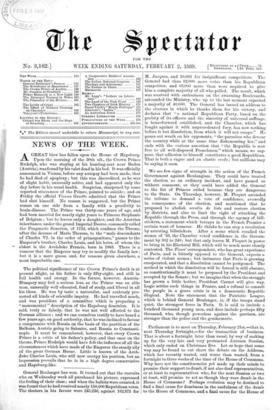We see few signs of strength in the action of
the French Government against Bonlangism. They could have treated the election as an ordinary incident, and have passed on without comment, or they could have added the General to the list of Princes exiled because they are dangerous to the State. On Thursday, however, M. Floquet ascended the tribune to demand a vote of confidence, avowedly in consequence of the election, and mentioned that he proposed to abolish scrutin de hate and restore election- by districts, and also to limit the right of attacking the Republic through the Press, and through the agency of bill- stickers, a statement which betrays in the French Premier a certain want of humour. He thinks he can stop a revolution by arresting billstickers. After a scene which recalled the scenes of '48, the Chamber voted confidence in the Govern- ment by 302 to 240; but that only leaves M. Floquet in power to bring in his Electoral Bill, which will be much more closely contested. The Times' correspondent, who has great experience of Paris, and is bitterly opposed to the General, expects a series of violent scenes ; but intimates that Paris is growing exasperated, and that a dissolution cannot be postponed. The method in which the dissolution will be forced is still obscure, as constitutionally it must be proposed by the President and accepted by the Senate ; but we imagine that when the struggle has grown a little hotter, President Carnot will give way. Logic settles such things in France, and a refusal to consult the people in a grave crisis is in a democratic Republic illogicaL Note the statement that the Patriotic League, which is behind General Boulanger, is, if the troops stand quiet, the strongest force in Paris. It is said to include a hundred thousand young men, and does include perhaps fifty thousand, who, though powerless against the garrison, are stronger than the police and the gendarmerie.


































